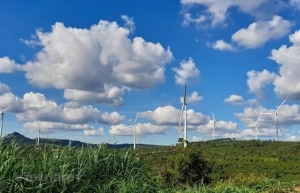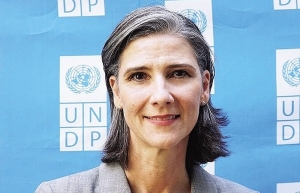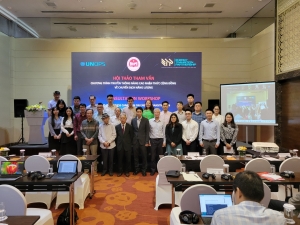Citi saw significant energy transition investment in 2023
Last year, Citi saw total energy transition investment increase faster than investment in fossil fuels supply.
While the annual increase was greater for clean energy, the overall total investment in traditional energy was still larger. Citi also saw significant investment in renewable energy.
The global bond market faced strong headwinds with high global interest rates, yet the Green, Social, Sustainability, and Sustainability-linked Bond (GSSSB) markets proved to be resilient.
 |
| Pham Huu Hai, Citi Vietnam’s Corporate Banking head and Citi Hanoi’s branch director |
GSSSB issuance volumes came to $845 billion for 2023, representing 6.3 per cent of the overall bond market, up from 5.6 per cent and 6.1 per cent in 2021 and 2022 respectively.
Asia-Pacific has been a high growth region for GSSSB issuance recently, with $250 billion issued last year, up 8 per cent on-year, and representing 8.5 per cent of the total volumes for the region, compared to 7.3 per cent in 2022 and 5.4 per cent in the year before.
Citi has committed to achieving net-zero emissions for its operations by 2030 and for its financing by 2050.
In 2021, the bank established its goal to finance and facilitate $1 trillion in sustainable finance by 2030 to further the transition to a sustainable and inclusive low-carbon economy.
The goal helps advance transition finance by supporting affordable and clean energy through investment in industries, companies, and technologies that will ensure the transition to a low-carbon economy.
Citi continues to progress towards meeting its $1 trillion sustainable finance goal with a wide range of products and services.
These include sustainable debt issuances such as thematic bonds and loans tied to environmental, social, and governance (ESG) performance; sustainable supply chain finance; sustainability-focused investments; mergers and acquisitions; and financing and advisory services to help companies make progress towards their own net-zero strategies.
The report highlights innovations in sustainable finance, including the World Bank’s emissions-reduction linked bond, which taps the voluntary carbon markets to help reduce emissions and finance school water purifiers in Vietnam.
"In Vietnam, Citi offers a comprehensive suite of corporate and investment banking products and services tailored to support companies actively involved in the energy transition.
By providing strategic financial solutions, we support these companies to not only execute on their business plans effectively, but also to achieve scalability and long-term success.
Citi is dedicated to driving sustainable economic growth in Vietnam through innovation and is committed to sustainability extending beyond the energy sector, collaborating with clients to advance their ESG and decarbonisation strategies," said Pham Huu Hai, Citi Vietnam’s Corporate Banking head and Citi Hanoi’s branch director.
Recently, Citi Vietnam was recognised as the Best Sustainable Bank for 2024 by FinanceAsia- the region’s premier capital markets publication, making a significant milestone as the bank celebrates its 30-year anniversary in Vietnam.
 | Renewable energy – leading solution to climate change mitigation in ASEAN Investing in renewable energy sources is as a palliative measure for ASEAN to mitigate climate change, according to Vice President of Infrastructure Solutions at Malaysian-based Vertiv Chee Hoe Ling. |
 | The keys to a just energy and coal-fired transition The Just Energy Transition Partnership (JETP) is a centrepiece of Vietnam’s commitment to achieve net-zero greenhouse gas emissions by 2050. Agreed between Vietnam and members of the International Partners Group (IPG) in 2022, the JETP aims to support the transition to green energy by providing funding in the form of grants, low-interest loans and investments from both the public and private sectors. |
 | Community awareness on energy transition is vital for progress Energy transition is a collective process, so to ensure active and voluntary participation from all stakeholders in society, a specific and meticulous communication plan is crucial, especially as the objectives align with Vietnam's pursuit of sustainable growth. |
What the stars mean:
★ Poor ★ ★ Promising ★★★ Good ★★★★ Very good ★★★★★ Exceptional
Related Contents
Latest News
More News
- Trung Nam-Sideros River consortium wins bid for LNG venture (January 30, 2026 | 11:16)
- Vietnam moves towards market-based fuel management with E10 rollout (January 30, 2026 | 11:10)
- Envision Energy, REE Group partner on 128MW wind projects (January 30, 2026 | 10:58)
- Vingroup consults on carbon credits for electric vehicle charging network (January 28, 2026 | 11:04)
- Bac Ai Pumped Storage Hydropower Plant to enter peak construction phase (January 27, 2026 | 08:00)
- ASEAN could scale up sustainable aviation fuel by 2050 (January 24, 2026 | 10:19)
- 64,000 hectares of sea allocated for offshore wind surveys (January 22, 2026 | 20:23)
- EVN secures financing for Quang Trach II LNG power plant (January 17, 2026 | 15:55)
- PC1 teams up with DENZAI on regional wind projects (January 16, 2026 | 21:18)
- Innovation and ESG practices drive green transition in the digital era (January 16, 2026 | 16:51)

 Tag:
Tag:


























 Mobile Version
Mobile Version